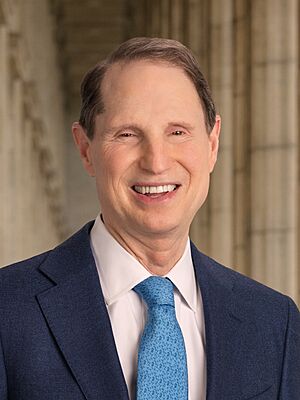Ron Wyden facts for kids
Quick facts for kids
Ron Wyden
|
|||||||||||||||||||||||||||||||||||||||||||
|---|---|---|---|---|---|---|---|---|---|---|---|---|---|---|---|---|---|---|---|---|---|---|---|---|---|---|---|---|---|---|---|---|---|---|---|---|---|---|---|---|---|---|---|

Official portrait, 2021
|
|||||||||||||||||||||||||||||||||||||||||||
| United States Senator from Oregon |
|||||||||||||||||||||||||||||||||||||||||||
| Assumed office February 6, 1996 Serving with Jeff Merkley
|
|||||||||||||||||||||||||||||||||||||||||||
| Preceded by | Bob Packwood | ||||||||||||||||||||||||||||||||||||||||||
|
|||||||||||||||||||||||||||||||||||||||||||
| Member of the U.S. House of Representatives from Oregon's 3rd district |
|||||||||||||||||||||||||||||||||||||||||||
| In office January 3, 1981 – February 5, 1996 |
|||||||||||||||||||||||||||||||||||||||||||
| Preceded by | Robert B. Duncan | ||||||||||||||||||||||||||||||||||||||||||
| Succeeded by | Earl Blumenauer | ||||||||||||||||||||||||||||||||||||||||||
| Personal details | |||||||||||||||||||||||||||||||||||||||||||
| Born |
Ronald Lee Wyden
May 3, 1949 Wichita, Kansas, U.S. |
||||||||||||||||||||||||||||||||||||||||||
| Political party | Democratic | ||||||||||||||||||||||||||||||||||||||||||
| Spouses |
|
||||||||||||||||||||||||||||||||||||||||||
| Children | 5 | ||||||||||||||||||||||||||||||||||||||||||
| Relatives | Peter H. Wyden (father) Franz Weidenreich (grand-uncle) |
||||||||||||||||||||||||||||||||||||||||||
| Education | University of California, Santa Barbara Stanford University (BA) University of Oregon (JD) |
||||||||||||||||||||||||||||||||||||||||||
| Signature | |||||||||||||||||||||||||||||||||||||||||||
| Website | |||||||||||||||||||||||||||||||||||||||||||
Ronald Lee Wyden (born May 3, 1949) is an American politician. He is the senior U.S. Senator for Oregon, a position he has held since 1996. As a member of the Democratic Party, he also served in the United States House of Representatives from 1981 to 1996.
Senator Wyden is known for his focus on protecting people's privacy, supporting internet freedom, and limiting how much the government can watch its citizens. He is seen as a strong supporter of civil liberties, which are the basic rights and freedoms of all people. He is currently the top Democrat, known as the ranking member, on the Senate Finance Committee.
Early Life and Education
Ronald Wyden was born in Wichita, Kansas. His parents, Edith and Peter H. Wyden, were Jewish and had to leave Nazi Germany. He grew up in Palo Alto, California, and played basketball for Palo Alto High School.
He attended the University of California, Santa Barbara, on a basketball scholarship. Later, he transferred to Stanford University, where he studied political science and earned his bachelor's degree in 1971. In 1974, he received a law degree from the University of Oregon School of Law.
Early Career
Before becoming a politician, Wyden taught about aging (called gerontology) at several universities in Oregon. He also started and led the Oregon chapter of the Gray Panthers, a group that works for the rights of older people, from 1974 to 1980. He was also the director of a non-profit legal service that helped elderly people in Oregon.
U.S. House of Representatives
In 1980, Wyden ran for the United States House of Representatives. At just 31 years old, he won against the person who was already in office, Robert B. Duncan, in Oregon's 3rd District. This district includes most of Portland.
He won the general election with 71% of the votes. The 3rd District is a very Democratic area, and Wyden was reelected seven times, always winning with more than 70% of the votes. During his time in the House, he helped pass Section 230 of the Communications Decency Act in 1996, which is an important law for the internet.
U.S. Senate
Becoming a Senator
In January 1996, there was a special election to fill a Senate seat that had become empty. Wyden won this election by a small number of votes against Gordon Smith. Wyden and Smith then served together in the Senate until Smith lost his reelection in 2008.
Wyden holds the Senate seat that was once held by Wayne Morse. Wyden worked for Morse in 1968 and considers him a mentor.
Reelection Campaigns
Wyden has been reelected to the Senate multiple times:
- In 1998, he won with 61% of the vote.
- In 2004, he was reelected with 64% of the vote.
- In 2010, he won with 57% of the vote.
- In 2016, he was reelected with 57% of the vote.
- In 2022, he won with 56% of the vote.
Key Actions and Stances
Wyden is known for being an "independent voice" for Oregon and the country. He focuses on topics like health care, national security, protecting consumers, and making government more open. He is often described as a "Hard-Core Liberal."
Internet and Privacy
Wyden has been a strong supporter of internet freedom and privacy.
- In 2004, he supported a permanent ban on taxes for internet access.
- In 2006, he introduced a law to stop internet providers from charging companies more for faster delivery of their content. He believed this would help small businesses compete.
- He has questioned how the government uses drones and collects data on Americans.
- In 2013, he said that Americans would be "extraordinarily surprised" if they knew how some laws, like the Patriot Act, were secretly interpreted by the government.
- He played a key role in stopping the Stop Online Piracy Act (SOPA) and the PROTECT IP Act (PIPA) in 2010-2012. These bills aimed to fight online piracy but were criticized for potentially harming internet freedom. Wyden's actions helped delay these bills, allowing people to speak out against them.
- In 2019, he proposed the Algorithmic Accountability Act to make sure that computer programs (algorithms) used by companies don't have unfair biases based on race or gender.
- He also proposed the Mind Your Own Business Act to give the Federal Trade Commission (FTC) more power to fine companies that violate privacy rules.
Health Care
Wyden has worked on health care reform.
- In 2009, he proposed the Healthy Americans Act, which aimed to create a national system of private health insurance.
- He supports increasing funding for Medicare, a government health insurance program for older Americans.
- He has worked to lower prescription drug costs.
- In 2011-2012, he worked with a Republican senator on a plan to reform Medicare, which would have included private insurance options.
Civil Liberties
- Gun Control: He supports stricter gun control measures, including increasing background checks and banning assault weapons. He has called for more research into gun violence prevention.
- LGBTQIA+ Rights: Wyden was one of the first U.S. Senate candidates to publicly support same-sex marriage in 1995. He voted against laws that would limit the rights of LGBTQIA+ individuals and has supported the Equality Act, which aims to prevent discrimination.
- Patriot Act: He voted for the Patriot Act after 9/11 but later became a strong critic of how it was used, especially regarding government surveillance. He voted against reauthorizing parts of the act in 2006.
Foreign Policy
- Iraq: Wyden voted against the use of military force in Iraq in 2002 and has consistently supported withdrawing U.S. troops from the country.
- Iran: He supported laws to prevent Iran from getting certain military parts and voted for sanctions against Iran.
- Israel: He has signed letters supporting Israel and co-sponsored a bill that would make it a federal crime to encourage boycotts against Israel.
- Russia: He voted for the New START treaty, which aimed to reduce nuclear weapons between the U.S. and Russia. He has also expressed concerns about the U.S. leaving other arms control treaties.
Climate Change
Wyden supports environmental protection and believes that climate change is a serious issue.
- He voted against limiting the Environmental Protection Agency's (EPA) ability to regulate greenhouse gas emissions.
- He supported the Clean Power Plan, which aimed to reduce carbon emissions from power plants.
- He has emphasized that the effects of climate change are already being felt across the United States.
Tax Policy
- Wyden has been critical of the estate tax (a tax on inherited money) and has voted to abolish it.
- He helped create the Internet Tax Nondiscrimination Act, which prevents taxes on internet access.
- He has supported lower corporate taxes and has worked to make tax laws simpler.
- In 2016 and 2019, he introduced the Presidential Tax Transparency Act, which would require presidents and presidential candidates to release their tax returns to the public.
Committee Roles
Wyden serves on several important committees in the Senate:
- Committee on the Budget
- Committee on Energy and Natural Resources (where he chairs the Subcommittee on Water and Power)
- Committee on Finance (Chair) - This is a very powerful committee that deals with taxes, trade, and health care.
- Select Committee on Intelligence
- Joint Committee On Taxation (Vice Chair)
Personal Life
Ron Wyden lives in Portland, Oregon, and also has an apartment in Washington, D.C.. He has two older children, Adam and Lilly, from his first marriage to Laurie Oseran, which ended in 1999.
In 2005, he married his current wife, Nancy Bass. She is the daughter of an owner of the famous Strand Bookstore in New York. They have three children together: twins born in 2007 and a daughter born in 2012.
In December 2010, Wyden had surgery for early-stage prostate cancer. He recovered quickly and returned to work in Congress the following month.
Images for kids
See also
 In Spanish: Ron Wyden para niños
In Spanish: Ron Wyden para niños
 | Janet Taylor Pickett |
 | Synthia Saint James |
 | Howardena Pindell |
 | Faith Ringgold |







